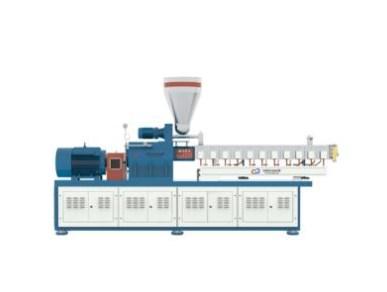The Practical Applications and Flexibility Offered by a Lab Scale Extruder Today

The Lab Scale Extruder is an essential tool in material development, process optimization, and small-scale production environments. Designed for research institutions, universities, and product development labs, it enables engineers and scientists to evaluate the behavior of polymers, food compounds, pharmaceuticals, and other extrudable materials without committing to large production runs. This compact yet highly functional equipment mimics the performance of industrial extruders but at a scale that allows for precise control, reduced material usage, and faster experimentation. Whether testing new formulations or fine-tuning process parameters, the Lab Scale Extruder offers a reliable and repeatable platform for innovation.
One of the primary advantages of using a Lab Scale Extruder is its ability to replicate the mechanical and thermal conditions of full-scale extrusion processes. This includes control over screw speed, temperature zones, pressure, and feed rates, all of which are critical for analyzing how materials behave during extrusion. By allowing operators to simulate real production scenarios, it provides accurate insights into how a compound will perform when scaled up, helping to reduce risks and costly adjustments in later stages. The modular design of many lab-scale systems also enables researchers to modify screw configurations or die shapes quickly, making it easier to adapt the machine to different materials or experimental goals.
The Lab Scale Extruder is particularly valuable in polymer science and compounding, where precise blending and thermal control are required to achieve desired material properties. It can be used to test additives, fillers, colorants, or even bio-based alternatives to traditional plastics. In the pharmaceutical industry, it serves as a tool for evaluating drug-carrier systems, controlled release profiles, or extrusion-based formulation strategies. For food technologists, it provides a way to assess texture, expansion, or nutritional modifications in extruded snacks and cereals. Across these fields, the repeatability and data quality produced by the Lab Scale Extruder allow researchers to make informed decisions based on empirical results.
Another significant benefit of the Lab Scale Extruder is its cost efficiency. Because it requires significantly smaller quantities of material compared to industrial-scale machines, it minimizes waste and lowers expenses during the development phase. This is especially important when working with expensive or limited-availability ingredients. Additionally, its compact footprint and simplified maintenance requirements make it suitable for laboratory environments without the infrastructure demands of larger equipment. Despite its size, the machine still provides meaningful throughput for pilot-scale production or niche product batches, enabling a smooth transition from R&D to commercial application.
Modern Lab Scale Extruder models are equipped with advanced monitoring and automation features. Integrated sensors track key variables such as torque, melt pressure, and temperature, while user-friendly software allows for data logging and remote control. These digital tools improve accuracy, repeatability, and regulatory compliance, particularly in industries where traceability is essential. Researchers can store, process data, replicate runs precisely, and adjust settings on the fly, streamlining both experimental work and documentation.
In conclusion, the Lab Scale Extruder is a versatile and indispensable asset for researchers and developers seeking to innovate in polymer processing, pharmaceuticals, food production, and more. Its ability to simulate industrial extrusion at a manageable scale makes it ideal for testing, optimization, and low-volume manufacturing. With enhanced control, efficiency, and adaptability, the Lab Scale Extruder supports faster innovation cycles and reduces the cost and complexity of bringing new materials or products to market.
- Art
- Causes
- Crafts
- Dance
- Drinks
- Film
- Fitness
- Food
- Games
- Gardening
- Health
- Home
- Literature
- Music
- Networking
- Other
- Party
- Religion
- Shopping
- Sports
- Theater
- Wellness


